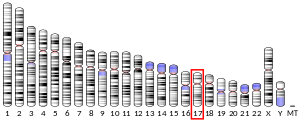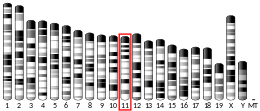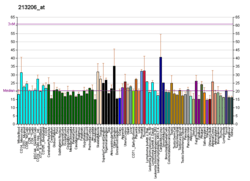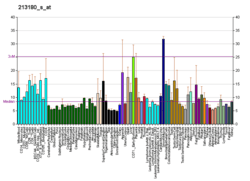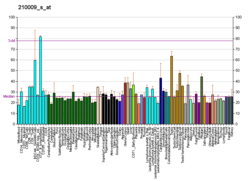GOSR2
Golgi SNAP receptor complex member 2 is a protein that in humans is encoded by the GOSR2 gene.[5][6][7]
Function
This gene encodes a trafficking membrane protein which transports proteins among the medial- and trans-Golgi compartments. Due to its chromosomal location and trafficking function, this gene may be involved in familial essential hypertension. Three transcript variants encoding three different isoforms have been found for this gene.[7]
Mutations in the GOSR2 gene are linked with North Sea progressive myoclonus epilepsy (NS-PME),[8] a rare subtype of progressive myoclonus epilepsy that is prevalent in northern Europe.[9]
Interactions
GOSR2 has been shown to interact with USO1[10][11] and STX5.[10][12][13]
gollark: Well, no, as I have no idea if anything else is running on there which uses port 53.
gollark: That looks as if you already have port 53 used by something else.
gollark: Apart from their ridiculous bridge mode requirements and not providing configuration, you mean?
gollark: Terrible upload speeds, CGNAT, not allowing you to use different and non terrible devices, etc.
gollark: Because ISPs often do stupid annoying things.
References
- GRCh38: Ensembl release 89: ENSG00000108433 - Ensembl, May 2017
- GRCm38: Ensembl release 89: ENSMUSG00000020946 - Ensembl, May 2017
- "Human PubMed Reference:". National Center for Biotechnology Information, U.S. National Library of Medicine.
- "Mouse PubMed Reference:". National Center for Biotechnology Information, U.S. National Library of Medicine.
- Lowe SL, Peter F, Subramaniam VN, Wong SH, Hong W (October 1997). "A SNARE involved in protein transport through the Golgi apparatus". Nature. 389 (6653): 881–4. doi:10.1038/39923. PMID 9349823.
- Bui TD, Levy ER, Subramaniam VN, Lowe SL, Hong W (April 1999). "cDNA characterization and chromosomal mapping of human golgi SNARE GS27 and GS28 to chromosome 17". Genomics. 57 (2): 285–8. doi:10.1006/geno.1998.5649. PMID 10198168.
- "Entrez Gene: GOSR2 golgi SNAP receptor complex member 2".
- Boissé Lomax L, Bayly MA, Hjalgrim H, Møller RS, Vlaar AM, Aaberg KM, et al. (April 2013). "'North Sea' progressive myoclonus epilepsy: phenotype of subjects with GOSR2 mutation". Brain. 136 (Pt 4): 1146–54. doi:10.1093/brain/awt021. PMID 23449775.
- Lambrechts RA, Polet SS, Hernandez-Pichardo A, van Ninhuys L, Gorter JA, Grzeschik NA, et al. (December 2019). "North Sea Progressive Myoclonus Epilepsy is Exacerbated by Heat, A Phenotype Primarily Associated with Affected Glia". Neuroscience. 423: 1–11. doi:10.1016/j.neuroscience.2019.10.035. PMID 31682953.
- Shorter J, Beard MB, Seemann J, Dirac-Svejstrup AB, Warren G (April 2002). "Sequential tethering of Golgins and catalysis of SNAREpin assembly by the vesicle-tethering protein p115". The Journal of Cell Biology. 157 (1): 45–62. doi:10.1083/jcb.200112127. PMC 2173270. PMID 11927603.
- Allan BB, Moyer BD, Balch WE (July 2000). "Rab1 recruitment of p115 into a cis-SNARE complex: programming budding COPII vesicles for fusion". Science. 289 (5478): 444–8. doi:10.1126/science.289.5478.444. PMID 10903204.
- Hay JC, Chao DS, Kuo CS, Scheller RH (April 1997). "Protein interactions regulating vesicle transport between the endoplasmic reticulum and Golgi apparatus in mammalian cells". Cell. 89 (1): 149–58. doi:10.1016/S0092-8674(00)80191-9. PMID 9094723.
- Hay JC, Klumperman J, Oorschot V, Steegmaier M, Kuo CS, Scheller RH (June 1998). "Localization, dynamics, and protein interactions reveal distinct roles for ER and Golgi SNAREs". The Journal of Cell Biology. 141 (7): 1489–502. doi:10.1083/jcb.141.7.1489. PMC 2133002. PMID 9647643.
Further reading
- Hay JC, Chao DS, Kuo CS, Scheller RH (April 1997). "Protein interactions regulating vesicle transport between the endoplasmic reticulum and Golgi apparatus in mammalian cells". Cell. 89 (1): 149–58. doi:10.1016/S0092-8674(00)80191-9. PMID 9094723.
- Hay JC, Klumperman J, Oorschot V, Steegmaier M, Kuo CS, Scheller RH (June 1998). "Localization, dynamics, and protein interactions reveal distinct roles for ER and Golgi SNAREs". The Journal of Cell Biology. 141 (7): 1489–502. doi:10.1083/jcb.141.7.1489. PMC 2133002. PMID 9647643.
- Xu D, Joglekar AP, Williams AL, Hay JC (December 2000). "Subunit structure of a mammalian ER/Golgi SNARE complex". The Journal of Biological Chemistry. 275 (50): 39631–9. doi:10.1074/jbc.M007684200. PMID 11035026.
- Shorter J, Beard MB, Seemann J, Dirac-Svejstrup AB, Warren G (April 2002). "Sequential tethering of Golgins and catalysis of SNAREpin assembly by the vesicle-tethering protein p115". The Journal of Cell Biology. 157 (1): 45–62. doi:10.1083/jcb.200112127. PMC 2173270. PMID 11927603.
- Honda A, Al-Awar OS, Hay JC, Donaldson JG (March 2005). "Targeting of Arf-1 to the early Golgi by membrin, an ER-Golgi SNARE". The Journal of Cell Biology. 168 (7): 1039–51. doi:10.1083/jcb.200409138. PMC 2171843. PMID 15781476.
- Rual JF, Venkatesan K, Hao T, Hirozane-Kishikawa T, Dricot A, Li N, et al. (October 2005). "Towards a proteome-scale map of the human protein-protein interaction network". Nature. 437 (7062): 1173–8. doi:10.1038/nature04209. PMID 16189514.
- Oh JH, Yang JO, Hahn Y, Kim MR, Byun SS, Jeon YJ, et al. (December 2005). "Transcriptome analysis of human gastric cancer". Mammalian Genome. 16 (12): 942–54. doi:10.1007/s00335-005-0075-2. PMID 16341674.
This article is issued from Wikipedia. The text is licensed under Creative Commons - Attribution - Sharealike. Additional terms may apply for the media files.
